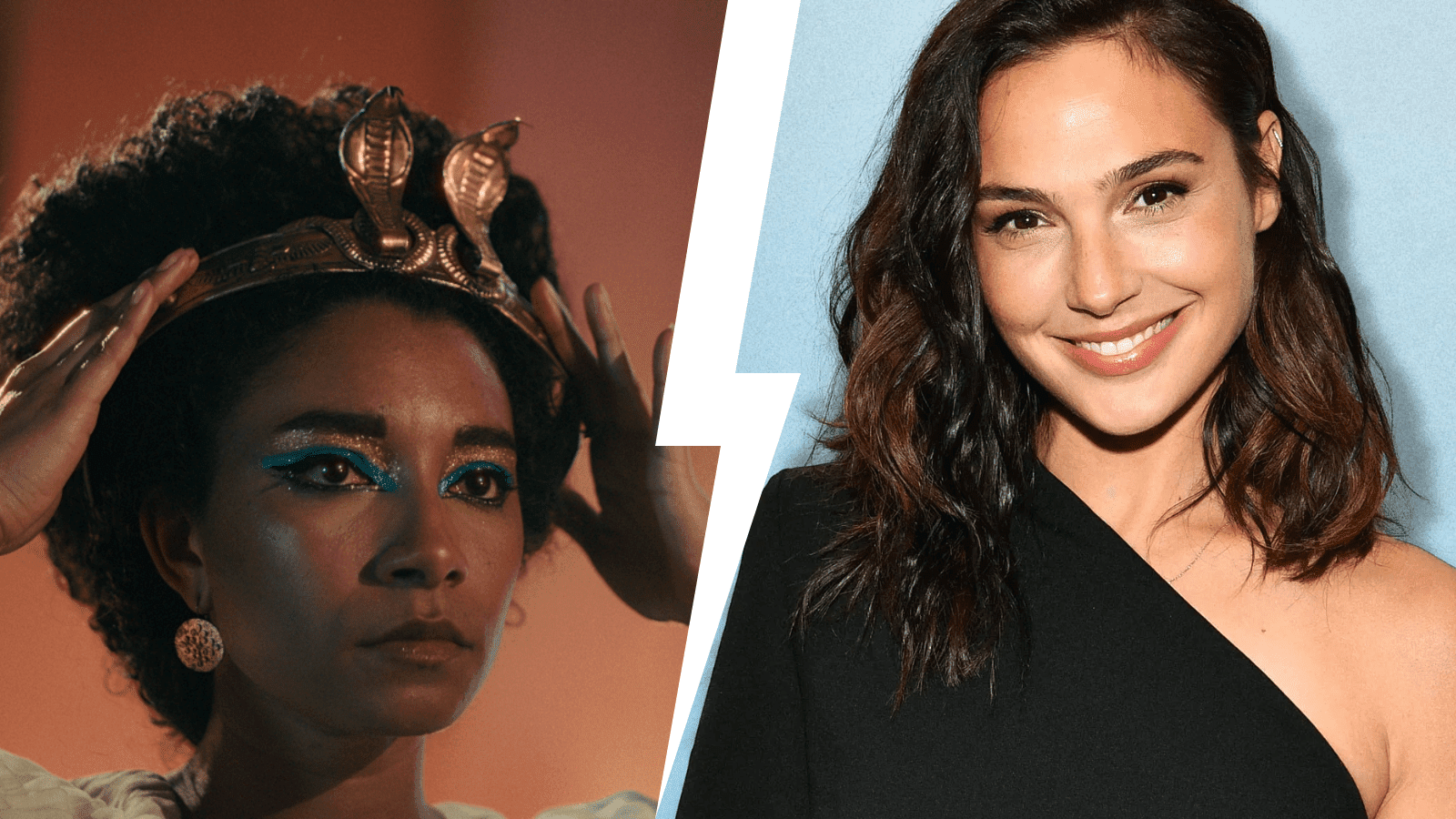We’ve been trying to avoid the conversation on the new Cleopatra documentary and the casting debate that’s happening because almost all conversations led to extensive racism, which is disgusting, to say the least. We wanted to take no part in it.
But apparently, the whole discussion started again after Egyptian comedian and media critic Bassem Youssef recently appeared on Piers Morgan’s show, TalkTV’s Piers Morgan Uncensored, to discuss the new Netflix docudrama, “Queen Cleopatra.” During the interview, Youssef criticized the Afrocentric movement for what he described as its appropriation of Egyptian culture and history.
Youssef, the former host of the popular TV show AlBernameg, emphasized that his criticism was not about “black and white.” Rather, he said, it was about the continuous cultural appropriation and falsification of history that has been done by the Afrocentric movement. He explained that the movement began in the last century as a way to teach African Americans about the rich history of West Africa and the great empires of Benin, Ghana, Songali, and Mali.
Youssef’s criticism of the Afrocentric movement’s appropriation of Egyptian history and culture raises important questions about the movement’s objectives and methods. His call to recognize the rich history of Egypt and its people, irrespective of their skin tone, is a timely reminder of the importance of embracing diversity and inclusivity in our understanding of history and culture.
With that said, it opened a flood of racism. Again.
The reaction has led to a valid question: why are Egyptians more offended by Adele James, a black actress, portraying Cleopatra than by an Israeli soldier or a non-Egyptian black actress like Zendaya?
It is not a defense of James’ casting, nor is it about Afrocentrism. Rather, it is a matter of why black people are triggering Egyptians more than an Israeli soldier. Egypt has many talented actors who could have played the role perfectly, and the casting decision is questionable at best. However, it is time to call out the racism that is behind this outrage.
But first, let’s give out some context.
Brief on Netflix’s upcoming Cleopatra documentary and the casting of Adele James and the controversy
The controversy surrounding the Cleopatra documentary started when Netflix announced that they had cast Adele James as the lead character. This decision immediately drew criticism from many Egyptians who argued that Cleopatra was not black and should not be played by a black actress.
Many people pointed out that Cleopatra was actually of Macedonian-Greek origin, and, therefore, should be played by someone of a similar ethnicity. The controversy has been so intense that an Egyptian lawyer has filed a lawsuit against Netflix, calling for the show to be canceled.
Meanwhile, Zahi Hawass, former antiquities minister of Cairo, has criticized the documentary as completely fake, claiming that Cleopatra was of Greek origin and therefore light-skinned, not black. Hawass has accused Netflix of spreading false and deceptive facts and trying to promote Afrocentric thinking that distorts and erases the Egyptian identity. He has urged Egyptians to take a stand against the streaming giant.
The four-part Cleopatra series will delve into the life, intellect, and legacy of the Greek Queen of Egypt from 51 to 30 BC. While the trailer acknowledges that Cleopatra belonged to the Ptolemaic dynasty, it disputes her heritage. One expert suggests that she may have been Egyptian, while another claims that his grandmother had said that Cleopatra was black, despite what schools taught. The official trailer, which was uploaded on April 12, has already received over 1.9 million views on YouTube.
Netflix has had to turn off comments on the official trailer after it sparked controversy. A Change.org petition to cancel the show has gathered over 7,000 signatures, while a previous petition with over 62,000 signatures was taken down.
Why Adele James’ Casting Triggered Major Outrage?

One of the main reasons why Egyptians are so outraged by the casting of Adele James as Cleopatra is because they feel that it is not historically accurate. Cleopatra was believed to be of Macedonian-Greek origin, and therefore many people feel that the casting of a black actress is not appropriate. This argument is supported by the fact that many historians have documented Cleopatra’s Macedonian-Greek heritage. However, some historians believe that Cleopatra may have been of mixed heritage and that her ethnicity is not fully understood.
Basically, Cleopatra looks like the average modern Egyptian woman.
Despite the lack of concrete evidence, there are those who argue that Cleopatra’s race and ethnicity are not the most important aspects of her legacy. They point out that she was a powerful and successful ruler, who was able to hold her own in a male-dominated world. She was a skilled diplomat and strategist, and she was able to negotiate with some of the most powerful leaders of her time, including Julius Caesar and Mark Antony.
Racism behind the Casting: a critique of Afrocentricism and Erasure of the Egyptian Identity
Another reason why Egyptians are so offended by the casting of Adele James as Cleopatra is because they feel that it is disrespectful to their culture and heritage. Cleopatra is a very important figure in Egyptian history and is considered by many to be one of the greatest Egyptian queens of all time.
Therefore, many Egyptians feel that it is inappropriate to have someone who is not of Egyptian descent playing such an important role in their history.
Adele James vs. Gal Gadot and Zendaya: the difference in the reaction of Egyptians
However, the controversy surrounding the casting of Adele James as Cleopatra raises some important questions about racism and discrimination in the entertainment industry. Why are Egyptians more offended by a black actress playing Cleopatra than an Israeli soldier or a non-Egyptian black actress like Zendaya?
Why is there so much outrage over the casting of Adele James but relatively little over other similar, or plain offensive like Gadot’s, casting decisions?

The answer to these questions lies in the complex history of race relations in Egypt and the broader Middle East. Egypt has a long history of racial and ethnic diversity, with influences from Africa, the Middle East, and Europe.
However, despite this diversity, there is still a strong sense of nationalism in Egypt, with many people seeing themselves as primarily Egyptian rather than African or Arab.
Therefore, the casting of a black actress as many Egyptians see Cleopatra as a threat to their national identity and cultural heritage.
Many people feel that by casting a black actress as Cleopatra, Netflix is trying to rewrite history and erase the Macedonian-Greek heritage of one of Egypt’s most important historical figures. This perception is reinforced by the fact that Cleopatra is often seen as a symbol of Egyptian greatness and power, and many people feel that this symbol is being taken away from them by the casting of a black actress.
However, it is important to recognize that this sense of nationalism has often been used to exclude and discriminate against minorities in Egypt, including black Egyptians and other people of African descent. While the situation has improved in recent years, there is still a lot of discrimination against black people in Egypt, and many people still hold racist beliefs and attitudes.
And this is exactly why less people were upset over Gal Gadot’s casting.
Ironically, Egyptians did not object to Gal Gadot’s casting as Cleopatra as much as they did to Adele James. Three years ago, plans for a new movie about the queen starring Israeli actress Gal Gadot caused a minor backlash, mostly on social media. Gadot stepped down from the film, and it was rumored that Zendaya would replace her. This was not met with as much controversy, possibly because Zendaya looks “less black” than Adele.

Ultimately, the debate over Adele James’ casting as Cleopatra highlights the ongoing struggles for representation and equality in the entertainment industry. It also underscores the need for greater education and understanding about history and culture, as well as the importance of engaging in respectful and productive dialogue around complex and sensitive issues.
The Tea:
As we continue to grapple with these questions, it is important to remember that there is no single right answer, and that progress can only be made through open and honest communication and collaboration.






Adele James should have done the right thing and stepped down like Gal Gadot did. I understand why the Egyptians are upset. As a lover of history, I’m upset about this too.
Imagine if Natalie Emmanuel was cast as Queen Elizabeth II instead of Claire Foy or someone made a film about George Washington and cast Peter Dinklage. Both of those people are very fine actors but the impact on the story would render it ineffective at giving a glimpse of believe history.
It affects the history when you portray people inaccurately. George Washington wasn’t a dwarf and Queen Elizabeth II wasn’t biracial.
Is the actress, Adele James, black? She is definitely mixed race and her skin tone is a sort of medium brown. I can find street scenes in Cairo and see that Egyptians come in a great variety of skin tones. So let’s not exclude Adele.
What was Cleopatra’s skin tone? Once you have decided she is not black, can you be sure there were no Egyptians in her ancestry? Some of us think it unlikely she was pure white, like Elizabeth Taylor. I think her character, her intelligence, and her savvy are more important than skin tones.
Yes. We have images of Cleopatra from around 50BC that shows her to be obviously Greek. Also royalty was notoriously inbred at the time. Stop with this ridiculous historical revisionism. With that, if the ONLY historical inaccuracies in the show were skin color then it wouldn’t be as big a deal. This show was afrocentric fanfic portrayed as a documentary.